- Home
- Harlan Ellison
No Doors No Windows Page 2
No Doors No Windows Read online
Page 2
(And I won’t have to argue with Tom Snyder that when I do the Tomorrow Show he shouldn’t have a flash-card overprinted on my beaming image that says HARLAN ELLISON, SCI-FI GUY.)
Where was I? Oh, yeah. A book of suspense stories, and how nice it is to finally get noticed as a writer who’s written lots of other things than fantasy.
It began, I suppose, when the Mystery Writers of America awarded me the Edgar Allan Poe statuette last year for the Best Mystery Story. The funny thing is, the story isn’t even a mystery. Not in the terms usually associated with mysteries. The yarn is the lead-off piece in this book, “The Whimper of Whipped Dogs.” And for those of you who bought THE OTHER GLASS TEAT [Pyramid A3791] and who read a script I wrote for the now-defunct TV series, The Young Lawyers, a script with the same title, be advised they have no connection. I just liked the title, “The Whimper of Whipped Dogs.” The story is…well, I’ll hold off on that till I hit the section of this introduction where I tip you to the background or impetus that caused me to write the various pieces included here.
In any case, what I was getting at is that “Whimper” is a fantasy, not a mystery. In the usual sense. Though I guess there must have been a sufficiently weighty suspense element in the story to convince the judges of MWA that it belonged on the ballot. (One tiny horn-toot: I beat out a story by Joyce Carol Oates for the award. Hot diggity!)
So here we have twenty years’ of my writing, all across the board from western stories and mystery fiction to critical literary essays and occasional columns of contemporary events, and they keep labeling me a “science fiction writer.” Very frustrating, particularly when my compatriots in the literature of the fantastic keep pointing out, “Ellison isn’t a science fiction writer,” and they’re right; and there’s no reason why they should have to suffer denigration because they’re held responsible for the berserk stuff I write. Also, my books shouldn’t have to suffer the kind of dumb reviews from the hinterlands—such as the New York Times—that say, “Well, this was a good book, but it certainly isn’t sf,” not to mention the treatment anything labeled sf gets from “serious” reviewers who will wax ecstatic about the nine millionth nostalgic novel dealing with Jewish or Italian home life in the poorer sections of Brooklyn or the Bronx in the late Thirties, but who turn up their patrician noses at anything with fantasy in it. Unless it’s by an accepted “serious” writer. Like Ira Levin or Fred Mustard Stewart or one of the many other nameless (and frequently talentless) clowns who’ve just last week discovered such fresh and untapped themes as exorcism, cloning, diabolic possession or reincarnation. If I had a dime for every half-assed novel published in hardcover since 1967 when Levin stumbled across ROSEMARY’S BABY, that deals with a supernatural or fantasy theme in cornball terms that would get it rejected from The Magazine of Fantasy & Science Fiction, I’d have a lotta dimes to make obscene phone calls to the know-nothing publishers who lay out fifty grand a whack to reprint them in paperback.
But then, I’m just an unhappy, bitter, sour grapes writer who resents the hell out of popularizers who get fat on worn-out themes sf/fantasy passed by twenty years ago, right?
So how come I ain’t pissed at John Fowles or John Barth or Vladimir Nabokov or Michael Crichton or Jorge Luis Borges or even Ira Levin? Answer: because they’re writers, dammit, and they bring freshness and talent even to tired ideas.
Thass why!
This has wandered rather far afield, I now realize. (If you want an eight-hour diatribe on the state of the market situation for a writer today, just drop in a slug, wind me up and aim me in the direction of The New York Literary Establishment.) Suffice to say, it ain’t all as terrific as it looks from the outside. Being labeled a science fiction writer today guarantees you a certain amount of readership, but it denies you an even larger group. For a writer who cares about what work comes out with his or her name on it, who fights to keep expanding his or her talent, and who wants freedom to experiment while making a decent living and providing entertaining books for as wide an audience as possible, having a category tag slapped on can be pure death.
So. A book of suspense stories. Filled with visions of murder, mayhem, deceit, fear, psychopathia, crime and rotten interpersonal relationships. Your basic light-time reading fare. Something to make you laugh at your own nasty life struggles. No matter how bad you’ve got it, believe me, you haven’t got it as tough as Beth O’Neill in “Whimper” or poor old Mr. Huggerson in “Status Quo at Troyden’s” or quick-tempered Hervey Ormond in “Ormond Always Pays His Bills.”
I’ve been talking a lot lately about the condition of fear by which many of us judge the value of our existences. In THE DEADLY STREETS (last month’s Pyramid paperback offering of the Ellison-of-the-Month Club) I did an introduction touching on the subject, and I’d like to share with you a letter I received yesterday that speaks to the same situation.
A word about my mail. There’s an ever-increasing amount of it these days, which is nice on the one hand because many people feel so comfortable in these books that they take the introductions and the comments as an invitation to chat; but it’s a drag on the other hand, because I’m averaging about 200 pieces a day, and even with two associates helping me out, just opening the mail has become a long, arduous chore each day. I tried sending out a long form letter for a while, but that was costing a fortune and it only encouraged the correspondents to write another letter. I read everything, but I’ve just simply decided to hell with it: I can’t reply to all that mail and still keep writing. And since it’s the stories and comments that make people want to write in the first place, that’s where my writing time should be spent, not in responding to questions about writing, my life, the correspondent’s life, how to write a teleplay, how to get an agent, where the Clarion Writers’ Workshop will be this year, why more of my books aren’t available in Kankakee or Billings, what my sexual proclivities might be, or why and how the letter-writer feels we are simpatico because the both of us hate a) Richard Nixon, b) Rod McKuen poetry, c) the military-industrial-CIA-FBI-IRS complex and/or d) movies starring Cybill Shepherd. I refuse to read stories submitted for my august opinion. For a lot of different reasons, but most prominently because I’m too deep into my own stuff to play teacher to amateurs. I used to send the following rejection note, but I don’t even do that any more:
A CHINESE REJECTION SLIP
Illustrious Brother of the Sun and Moon:
Behold thy servant prostrate before thy feet! I kowtow to thee and beg that of thy graciousness thou mayest grant that I may speak and live. Thine honored manuscript has deigned to cast the light of its august countenance upon me. With raptures I have perused it. By the bones of my ancestors, never have I encountered such wit, such pathos, such lofty thought! With fear and trembling I return the writing. Were I to publish the treasure thou hast sent me, the Emperor would order that it be made a standard of excellence and that none be published except such as equaled it. Knowing literature as I do, and that it would be impossible in ten thousand years to equal what thou hast done, I send thy writing back by guarded servants.
Ten thousand times I crave thy pardon. Behold! My head is at thy feet and I am but dust.
Thy servant’s servant,
Wan Chin (Editor).
Note: author unknown.
So the point of this digression is to plead with you not to write to me unless you want to give me money. And since that eliminates 99% of you, all that remains is for me to express my gratitude for your wanting to write me, even if it was only to tell me what a bastard I am. But we’ll get along much better if we keep the communication a telepathic one. You just shoot the good vibes in my direction, I’ll pick up on them, it’ll spur me to more and better stories, and we’ll both come out happier and more productive. Please!
(God, I’m scatterbrained here. I keep going off into every little byway of thought that presents itself. Like one of my lectures. Very free-form. But let me wrench myself back to the topic of fear and lay that letter on y
ou.)
I’m having it set by the typographer exactly as I received it. Hold it! Another digression, but to the point. I recently had a burn experience with a dude who sent me a letter hi response to the dedication of one of my books. The book was dedicated to the memory of the Kent State students who were slaughtered, and one day a few months after the book first came out, in flew this letter, informing me those college students were Commies and they deserved to be shot. Well, last year I did another book; in the introduction to that one I reprinted the dedication from the first book and the guy’s letter. It wasn’t a nut-case letter, despite the content; it was well-written, grammatical, perfectly coherent; I said so in the introduction, but went on to comment how sad such brutal beliefs, in these perilous times, made me feel. Well, the tone of the letter was a mild one—the guy said he just wanted to straighten me out on how the world was really run—and it seemed to me to be one of those probably misguided but at least honest communiques. Imagine my feelings of revulsion when, six months after publication of the book containing the letter, my publisher and my agent received a terse communication from this wonderful, patriotic American chap who “only wanted to straighten me out,” demanding “substantial remuneration” for the use of his letter. Apparently, he wasn’t quite as selfless and dedicated to his beliefs as the innocent letter seemed. He was clearly another one of those whiplash cases trying to make a few bucks from a nuisance suit. Well, at least, that’s how it looked to me; it also looked that way to my publisher, my agent, and my attorneys, who sent him a long, detailed legal brief explaining why he had no claim and could forget the whole attempt at the grab.
I mention this here, before running another unsolicited letter, just to let the author of the missive following know that he has no claim, either. Notably, because it’s an anonymous letter, and because I suppose I agree with it.
But, anyhow, on the subject of fear, here’s another face of the monster. I reproduce it in the form I received it, without grammatical corrections. It’s disturbing, to say the least.
Mr. Ellison,
I plead guilty. I’m the one…
…removing the drunk from the emergency room to late. The eighteen year old girl has died while the doctor was preoccupied with the drunk. I’m listening to the nurses deciding how to fake the report on the girl who should not have died. The explaining to the mother is mine.
…picking up drunks at midnight in frount of the bar full of onlookers shouting and screaming protest. I left a drunk here once before and he ended up a crippled vegestable when these kind folks robbed him. So I pick up the drunks and take them (not to jail?) home.
…finding the kid swearing to commit suicide and take him to the hospital. The one who talks to him when the psychiatrist tells him to go to hell. I’m the one finding him the next day, a block away, face up, dead.
…wondering what the hell is wrong when I pick up a kid speeding thru the hospital zone to late. Something went wrong. Did the pedestrian know that she was carried six blocks on the boy’s frount fender before she slid under the wheels? Why blame the kid? He didn’t buy the car or set up the law.
…bastard who was trying to give a kid an even break when I caught him running from a mobile home with the goods. The idea wavered when the owner stumbled out with a busted head.
…fool trying to turn kids over to their parents. I call and talk to some kid’s little sister saying mommy isn’t home and, oh, by the way, mommy wants to know what Jonny did. So the kid goes to jail to lose his rights, his scholarship, and his future career.
…motherfucker buying the coke for the scared kid who threw piss on me from a can. I let him go becuase no parents show.
…Idiot who fought on oil-duty cop to save derelict with a lip from a belting.
…whose a State police officer that is just like every city and federal officer across the United States. Just a guy trying to protect people from themselves.
…who wants to stop working in this lousy business but can not. I can not let some trigger-happy cop take my badge. I can’t let people kill the loser when he is down. I can’t let you kill because of hate, carelessness or indifference. I’ll die one day protecting the losers you and the Society of Man hate so much because I’m a loser too. If there is anything lower than Black, it’s Blue.
…who personally likes your writing about reality. In your stories I don’t escape reality, but see an end to this senselessness. Either good or bad wins in your story and with the end I’m satisfied because I’m so tired of the war. But I’m one who’ll never agree that all cops are bad, and one who’ll probably die by your hand or others like them either physically or spiritually in the street.
Sincerely, *
A Policeman.
Whew! Occasionally, gentle readers, the mail gets heavy in here. The letter from the nurse I quoted in PAINGOD [Pyramid V3646]. The suicide note from the woman who said one of my stories kept her going a few weeks longer than she would have hung on otherwise. The unsigned letter from the Viet Nam vet who confessed to all the people he’d shot up in free-fire zones. The crazed postcard from the Fundamentalist loonie who vowed he’d kill me because I was obviously the antichrist. My patriotic whiplash correspondent with the scoop on Kent State. And now this one.
Listen, friend, if you’re out there, and you’ve picked up this book, let me tell you I neither hate nor fear you. Even swathed in Blue, m’man, you come across filled with pain and concern. I would like to meet you some day. But only when you’re off-duty, when you’re not packing heat.
I know damned well there are cops like you. I’ve met a few; and they always wind up like Serpico, brokenhearted or bust-headed. Because police these days aren’t like police when I was a kid in Painesville, Ohio in the Forties. Friend of mine, a lieutenant of homicide, got a trifle bombed one night, sitting around rapping with me, and he let slip one of the most scarey things I’ve ever heard. He said, “Harlan, it used to be, when a cop said ’them or us’ he meant us were the good people, the cops and the decent citizens and the responsible business community, anybody on the side of Law and Order, the way it used to be in those Frank Capra films. Them meant bank robbers, homicidal maniacs, rapists, guys who torched their own stores for the insurance, murderers, all the kooks. Things’ve changed so much, these days when we say ‘them or us’ we mean anybody with a badge is us…all the rest of you are them.”
There are lines written by Maxwell Anderson in the Kurt Weill musical tragedy version of Alan Paton’s book CRY, THE BELOVED COUNTRY—the stage production is, of course, LOST IN THE STARS—in which the chorus sings of the condition of fear that existed (and exists) in South Africa, the fear of the whites for the blacks, the fear of the blacks for the whites, and the lines are, “It is fear! It is fear! It is fear! It is fear!/Who can enjoy the lovely land,/The seventy years,/The sun that pours down on the earth,/When there is fear in the heart?…Yes, we fear them./For they are many and we are few!…Yes, we fear them,/Though we are many and they are few!…Men are not safe in the streets,/Not safe in their houses./There are brutal murders, robberies./Tonight again a man lies dead./Yes, it is fear./Fear of the few for the many,/Fear of the many for the few.”

 Repent, Harlequin! Said the Ticktockman
Repent, Harlequin! Said the Ticktockman Broken Glass
Broken Glass Other Glass Teat
Other Glass Teat Memos From Purgatory
Memos From Purgatory I Have No Mouth and I Must Scream
I Have No Mouth and I Must Scream The Deadly Streets
The Deadly Streets The Glass Teat
The Glass Teat Paingod and Other Delusions
Paingod and Other Delusions No Doors No Windows
No Doors No Windows Strange Wine
Strange Wine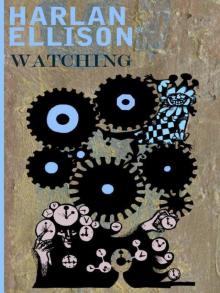 Harlan Ellison's Watching
Harlan Ellison's Watching Over the Edge/An Edge in My Voice
Over the Edge/An Edge in My Voice Troublemakers: Stories by Harlan Ellison
Troublemakers: Stories by Harlan Ellison Gentleman Junkie and Other Stories of the Hung-Up Generation
Gentleman Junkie and Other Stories of the Hung-Up Generation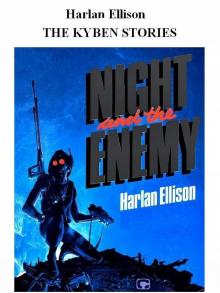 The Kyben Stories
The Kyben Stories From the Land of Fear
From the Land of Fear The Top of the Volcano: The Award-Winning Stories of Harlan Ellison
The Top of the Volcano: The Award-Winning Stories of Harlan Ellison Sleepless Nights in the Procrustean Bed
Sleepless Nights in the Procrustean Bed Ellison Wonderland
Ellison Wonderland Children of the Streets
Children of the Streets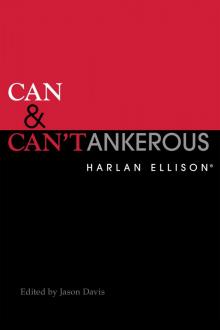 Can & Can'tankerous
Can & Can'tankerous Love Ain't Nothing but Sex Misspelled
Love Ain't Nothing but Sex Misspelled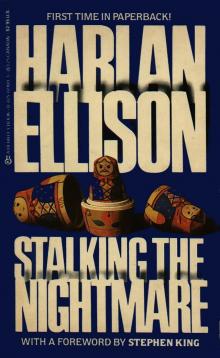 Stalking the Nightmare
Stalking the Nightmare Approaching Oblivion
Approaching Oblivion Deathbird Stories
Deathbird Stories Partners in Wonder
Partners in Wonder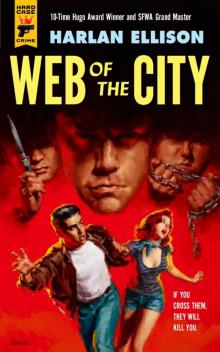 Web of the City
Web of the City Spider Kiss
Spider Kiss A Boy and His Dog
A Boy and His Dog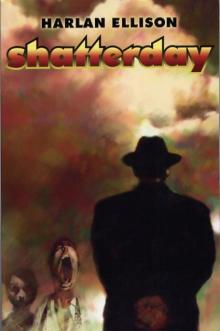 Shatterday
Shatterday Slippage: Previously Uncollected, Precariously Poised Stories
Slippage: Previously Uncollected, Precariously Poised Stories Repent, Harlequin! Said the Ticktockman
Repent, Harlequin! Said the Ticktockman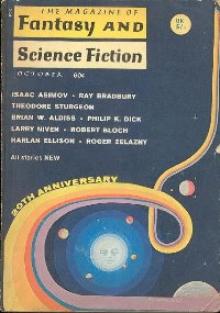 Come to Me Not in Winter's White
Come to Me Not in Winter's White The Song the Zombie Sang
The Song the Zombie Sang The Other Glass Teat
The Other Glass Teat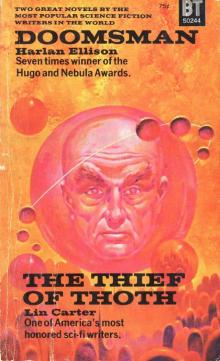 Doomsman - the Theif of Thoth
Doomsman - the Theif of Thoth The City on the Edge of Forever
The City on the Edge of Forever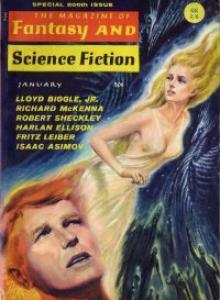 I See a Man Sitting on a Chair, and the Chair Is Biting His Leg
I See a Man Sitting on a Chair, and the Chair Is Biting His Leg The Harlan Ellison Hornbook
The Harlan Ellison Hornbook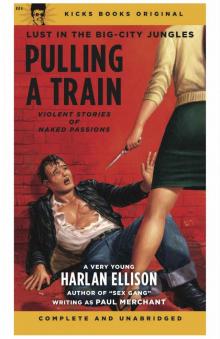 Pulling A Train
Pulling A Train The Glass Teat - essays of opinion on the subject of television
The Glass Teat - essays of opinion on the subject of television An Edge in My Voice
An Edge in My Voice Angry Candy
Angry Candy Troublemakers
Troublemakers The Top of the Volcano
The Top of the Volcano Over the Edge
Over the Edge Survivor #1
Survivor #1 Slippage
Slippage